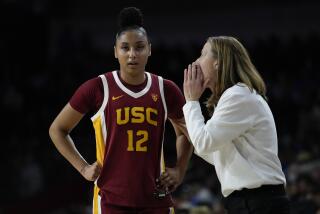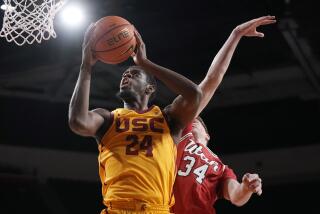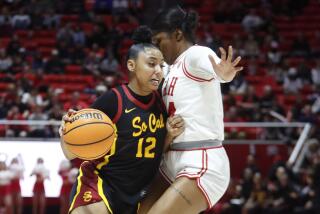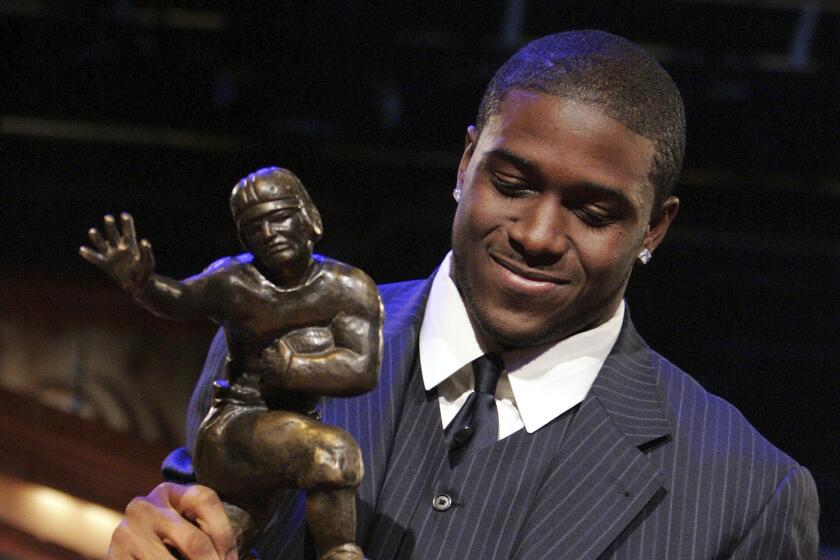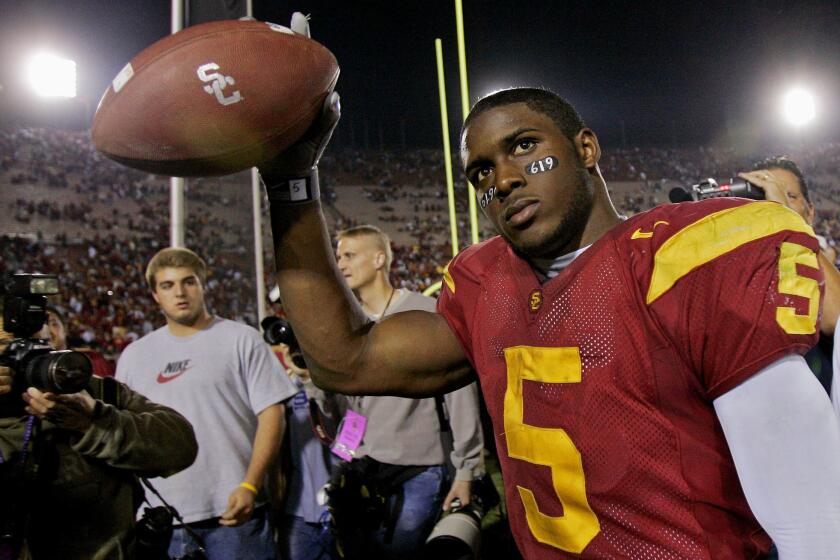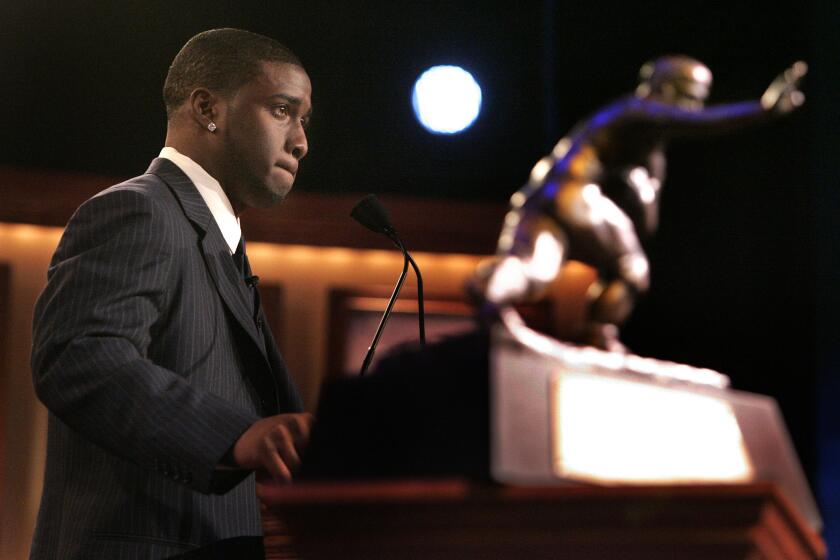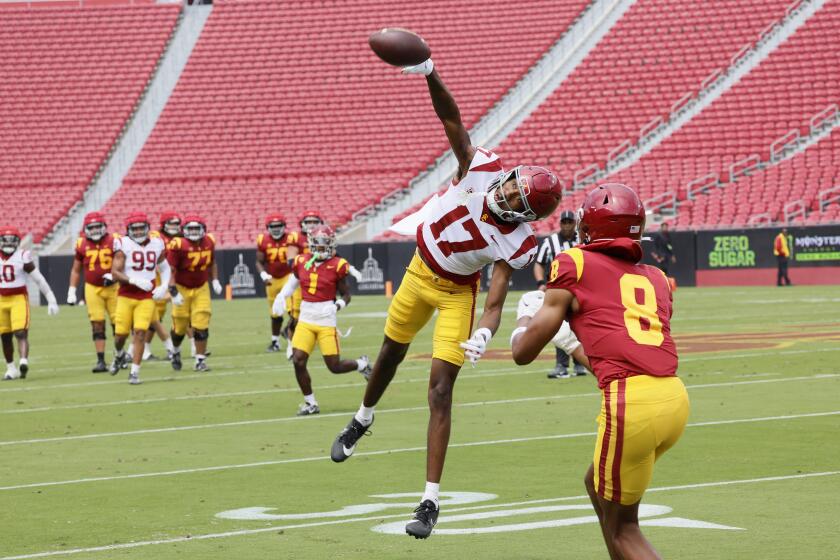Fallout continues from adjusted score on USC’s win over Utah
Tony Corrente had a busy weekend.
The Pacific 12 Conference’s coordinator of football officials spent Sunday refereeing a game between the Baltimore Ravens and the Pittsburgh Steelers, an assignment that left him flat on his back for a few moments after he was knocked down trying to break up a skirmish.
After the NFL game, Corrente issued a statement about USC’s 23-14 victory over Utah on Saturday that said there was a “miscommunication between the officials and the press box that led to the confusion about the final score.”
Corrente returned Monday to Pac-12 headquarters in Walnut Creek, Calif., and spent most of the day trying to manage the continuing firestorm that began because the score was initially recorded by press box officials as 17-14.
“All we did was clarify the score,” Corrente said in a telephone interview. “We did not change the score.”
Meantime, the controversy continues in Las Vegas, where sports books invoked “house rules” to determine whether they would pay on one score or the other — or both.
Jerry Markling, chief of the enforcement division for the Nevada Gaming Control Board, said in a telephone interview that the staff had initiated nine “investigative cases” about disputes and that it was awaiting more information about possible others.
Markling said he could not recall a similar circumstance.
“We get all kinds of different issues that come up,” he said, but none that involved a final score.
USC clinched the victory by blocking a field-goal attempt in the final seconds. Cornerback Torin Harris picked up the ball and returned it 68 yards to the end zone. While Harris sprinted toward the goal line, USC players left the bench and ran onto the field to mob Harris in the end zone.
Confusion ensued because an official threw a penalty flag and none of the field officials appeared to clearly signal a touchdown.
In announcing an unsportsmanlike-conduct penalty against USC, the referee did not communicate over the public address system that the touchdown counted.
Corrente said the official was not required to do so, but if he had, it would have saved confusion.
“My assumption is that somebody in the press box had to have misinterpreted the referee’s declining signal for the foul to mean that the touchdown was no good,” Corrente said.
Corrente said an official saw 23-14 on the scoreboard at the peristyle end of the Coliseum. The officials left the field, went to their locker room and filed a postgame report with a score of 23-14.
Scoreboard operator Kyle Lucas confirmed that the 23-14 score was posted briefly but said he took it down after seeing the penalty flag. He said members of the statistics crew told him not to re-post the points.
About an hour later, members of the officiating crew were approached in the parking lot by USC radio broadcasters Pete Arbogast and Paul McDonald, who asked them why the touchdown was taken off the scoreboard.
“To a man, they turned and said, ‘Huh? What do you mean?’ ” Arbogast said. “None of them had any idea that it was even an issue to that point.”
The officials contacted the Pac-12 office, starting a process that eventually produced a statement from Mike Pereira, a Pac-12 officiating consultant. He said the penalty was a dead-ball foul that could not be enforced because the game had ended. He also said officials had ruled the play a touchdown.
“The penalty is one of those weird ones that would be enforced on the next kickoff,” Corrente said. “But there’s no kickoff, so that’s why you dispense of the penalty.”
NFL rules require that an extra point be attempted because point differential is part of the league’s tiebreaker system. College rules say a team can try an extra point when games end with a touchdown, Corrente said, but are not required to do so.
Quick hits
USC resumes practice Tuesday in preparation for Saturday’s home game against Syracuse. … Trojans receiver Robert Woods is averaging 12.5 receptions per game, tied for second nationally with Notre Dame’s Michael Floyd. Oklahoma’s Ryan Broyles is averaging 14 catches.
twitter.com/latimesklein
More to Read
Go beyond the scoreboard
Get the latest on L.A.'s teams in the daily Sports Report newsletter.
You may occasionally receive promotional content from the Los Angeles Times.
